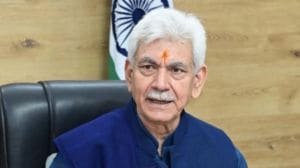In chasing Bush democracy ‘agenda’, Rice’s worldview flips, policies flop
As Condoleezza Rice jets around the world, she must sometimes wonder where she’s going. Over her three years...

As Condoleezza Rice jets around the world, she must sometimes wonder where she’s going. Over her three years as Secretary of State, she has squandered great opportunities by putting faith and loyalty above her old worldview. The problem isn’t just that she has swerved from the realism that propelled her to prominence, it’s that the result has been in a shambles.
Rice is not used to failure. In Beltway wisdom, she’s the star of President Bush’s second-term team, someone who has employed smarts, sense and style to try to steer a wiser course in the world. But if she is now veering back to realism, it is after too long a detour into post-9/11 messianism. Rice remains one of the architects of a fantasy foreign policy, and her record as Secretary of State gives little hope that she will be able to reverse that verdict in the administration’s final months.
The case against Rice starts with her dismal tenure as National Security Adviser in Bush’s first term. Her main task was to coordinate policy, but she was outmanoeuvered at every turn by the ruthless infighters around her.
So, she focused on the job’s other mandate: counselling the unschooled President on foreign affairs. As Bush’s tutor in the 2000 campaign, she gained his trust.
The State Department seemed a place where she could make the most of that asset. She would finally be a player, a Cabinet Secretary with a budget, a bureaucracy and something her beleaguered predecessor Gen Colin L Powell never had. At first, she did things that Bush had previously resisted — reopened nuclear talks with Iran and North Korea, pushed a UN Security Council resolution on war crimes in Sudan, and (unlike Powell) travelled, a lot.
The early reviews were glowing. The media compared her to George Marshall, marveled at her “perfectionist drive” and parsed “the Condi doctrine”. But she was only doing things that most secretaries of state do routinely.
The problem was that, in the course of counseling George W Bush, she fell under his tutelage much more than vice-versa. Instead of informing his instincts, she formalised them into doctrine, and came to believe in it herself.
In his second inaugural address, Bush declared that his main goal would be to end tyranny and spread democracy around the world. Rice took it as signs that the world was spinning on a new axis.
Rice had spun 180 degrees from the positions she’d held for the previous 30 years. In the mid-1970s, as a graduate student at the University of Denver, she’d been the star pupil of Josef Korbel (the father of former Secretary of State Madeleine Albright.
In the late 1980s, Brent Scowcroft, President George H W Bush’s National Security Adviser, hired Rice onto his staff. While advising Bush’s son during his 2000 presidential campaign, Rice remained firmly in this mold.
Cynics ascribed it to a psychological complex about powerful male tutors.
At times this year, Rice seems to have returned to her realist roots, most notably in striking a quick nuclear disarmament deal with North Korea.
Finally, there looms Iraq. This war has been Rice’s war as much as anybody’s in the administration. Long after her celebrity and charm have been forgotten, her epitaph will endure: She pursued democracy at the expense of stability, and achieved neither.





- 01
- 02
- 03
- 04
- 05


























